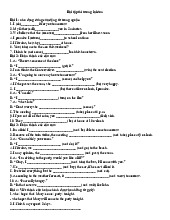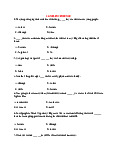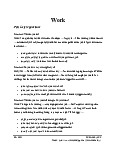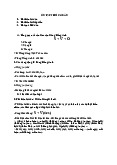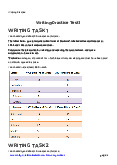


Preview text:
Berrak: A pianist
I started playing the piano when I was four years old. My mother thought it would be a
good outlet for positive childish energy and I was really into it; it was exciting. It was
something different and I had much more time to practise then. The first time I performed
in front of an audience was when I was five years old and I loved it. (question 1) I went
on a summer camp run by my piano teachers at the time and at the end of the week we all
got up and played a piece. At that age I was unaware of any of the pressure associated
with performing live so it just felt nice to have people concentrating on my playing and I
liked the applause and attention. (question 2) Now I perform regularly, often in front of
large audiences, and I still really enjoy it.
I always knew I wanted to be a pianist and never thought I would do anything else. In
that respect I felt different from my friends when I went to school; they all thought they
wanted to become teachers or doctors and things like that and I just knew I would be a
pianist but it didn’t feel strange. (question 3) Finding time to play and practise wasn’t a
problem at school until my last few years when the pressure of exams and things was
hard, but generally I would choose to practise instead of doing homework. It always felt
like schoolwork got in the way of playing the piano rather than the other way around.
Unfortunately I was never given any special allowances or extended deadlines though.
After I finished school I went on to study a degree in music and now I’m studying a
Masters degree in accompaniment.
A typical day now involves a couple of hours practice in the morning before going into
college and attending classes. I spend a lot of time in the library listening to music, trying
to learn and become familiar with new pieces of music. One downside to choosing to
study and pursue a career in music is that you end up spending hours and hours by
yourself. However. I also try to spend time at college meeting other people and
networking. The more musicians I know the more likely I am to be asked to play for
others. (question 4) The more I play the better known I become and in the music business
it’s all about recognition and getting your name out there. It's important to get involved in
as many performances as possible and take part in competitions so that as many people as
possible see you perform and know who you are. (question 5) It’s a very competitive
industry. Ultimately, if I am asked to play and get given a job it means that someone else
loses work and sometimes it feels like a constant battle. (question 6) You can’t help being
drawn into an artificial world where you are constantly comparing yourself to others and
are always worried about what others think of your performances. In the real world
outside of college your audience is much wider.
I chose to get involved in accompaniment because as much as I love playing the piano I
also enjoy working with others. (question 7) And working as an accompanist is a good
way of doing that. There are also more job opportunities as although there is still a lot of
competition other performers will always need good accompanists, so there is more
demand. I really enjoy performing with other people because there’s an even greater
sense of achievement when you are both on form and a piece comes out amazingly.
To follow a career in music you have to have a real passion for it as unfortunately it’s not
a very secure path and it’s not usually very well paid. Having said that, the real positive
side is that I am doing something I love; it’s not just a subject to study. I love everything
associated with music and performing and it’s what I do every day. (question 8)
1. How did she feel the first time she performed in front of an audience?
A. nervous and under pressure
В. strange because everyone was looking at her С. happy and relaxed
D. She was concentrating so much on playing she didn’t notice the audience.
2. How did Berrak feel about playing the piano when she was very young? A. She really enjoyed it.
В. She only did it because her mother wanted her to.
С. She didn’t like the fact she had to practice a lot.
D. She felt strange and different from her friends.
3. Why did Berrak feel different from her friends when she was at school?
A. Because the teachers gave her less homework.
В. Because her friends didn't know what career they wanted to follow.
С. Because she was the only one who wanted to become a musician.
D. Because she found the pressure of exams less stressful.
4. Why does she say it is important to meet and talk to other musicians at her college?
A. Because the music industry is very sociable and it’s important to have lots of friends.
В. Because she feels lonely after spending so much time by herself.
С. Because other musicians in the college are very supportive of each other.
D. Because it increases her possibilities of being asked to perform.
5. When she says that ‘in the music business it’s all about recognition and getting
your name out there’ what does she mean?
A. It’s important that people know who she is when they see her photograph.
В. It’s important that lots of people know what she does and know her name.
C. Her name is more important than the way she plays.
D. Her name needs to be easy for people to recognise and remember.
6. Why does the college environment often feel like a constant battle?
A. Because there isn’t enough work for everyone.
В. Because she doesn’t get on with the other students there.
С. Because there are lots of competitions.
D. Because the teachers are always comparing the students and deciding who is better.
7. Why did Berrak decide to go into accompaniment?
A. Because she thinks it can be more challenging.
В. Because it’s better paid.
С. Because she can achieve more and become more well-known.
D. Because she likes working as part of a team.
8. What does she say is the best thing about studying and pursuing a career in music?
A. She could become rich and famous.
В. There are lots of job opportunities.
С. She spends all her time doing something she loves.
D. She finds it an easy subject.
